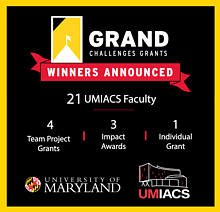21 UMIACS Faculty Involved in Eight Grand Challenge Grants

The University of Maryland has announced an investment of more than $30 million in funding to address major societal issues ranging from climate change to illiteracy to pandemic preparedness and much more.
The Grand Challenges Grants program will support 50 projects from across the campus, with 21 faculty from the University of Maryland Institute for Advanced Computer Studies (UMIACS) involved in eight of them.
“This is fantastic news that truly represents the breadth and impact of our research enterprise,” says Mihai Pop, a professor of computer science and the director of UMIACS. “The significant number of faculty involved—representing seven academic departments—speaks directly to our mission of using interdisciplinary research and scholarship to address grand challenges in science and society. I couldn't be prouder of my colleagues.”
See below for a summary of projects UMIACS faculty are involved in.
• Of the six impact grants awarded, UMIACS faculty are active in three: The “Values-Centered AI Initiative” project includes Hal Daumé, Katie Shilton, John Horty, Jordan Boyd-Graber, Furong Huang, Vanessa Frias-Martinez, Louiqa Raschid, Marine Carpuat, Pratap Tokekar, John Dickerson and Huaishu Peng; the “Center of Excellence in Microbiome Sciences” includes Brantley Hall and Mihai Pop; and the “Maryland Institute for Digital Accessibility” includes Huaishu Peng, Niklas Elmqvist, Ge Gao and Abhinav Shrivastava.
• Of the 16 team project grants awarded, UMIACS is active in four: The “Music Education for All” project includes Cornelia Fermüller; the “Fostering Inclusivity Through Technology” project includes Louiqa Raschid, Niklas Elmqvist and Ge Gao; Christopher Metzler and Maria Molina are co-PIs for their “Effective and Equitable Weather Forecasting in a Changing Climate” project; and Wei Ai is part of the “M-Powering Teachers: ML to Improve Equity in K–12 Math” project.
• Michael Cummings was the recipient of a single PI project grant for his work involving “Accurate, Equitable, and Transparent Genetic Ancestry Inference.”
—Article by UMIACS communications group
